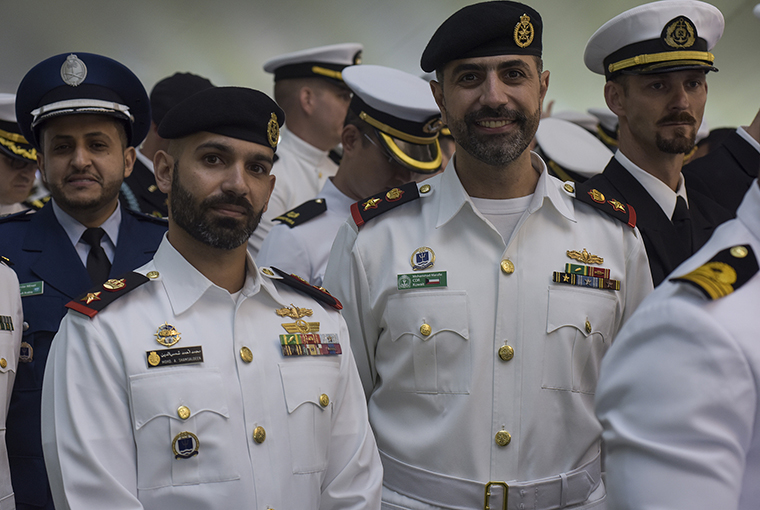U.S. Naval War College Graduates 1,535 in Ceremony

NEWPORT, R.I. – U.S. Naval War College (NWC), Newport, RI, graduated 1,535 students during a ceremony held June 15 at Dewey Field on board Naval Station Newport in Newport, Rhode Island.
Secretary of Defense James N. Mattis delivered the commencement address to the graduates.
“Congratulations to all of you graduates on your achievements here today and to the families that stood by you as you burned the midnight oil here at a school known for its intellectual rigor,” said Mattis.
During the ceremony, graduates were presented with Master of Arts degrees in National Security and Strategic Studies or Defense and Strategic Studies. International graduates were awarded an NWC diploma.
There were 151 graduates from the College of Naval Warfare, the senior-level course; and 172 from the College of Naval Command and Staff, the intermediate-level course. These students are members of the Navy, Marine Corps, Air Force, Army, Coast Guard or civilian government employees.
NWC's Naval Command College and Naval Command and Staff College graduated 103 international officers. The College of Distance Education graduated 1,109. These students completed requirements through the Fleet Seminar Program, web or CD-ROM-based courses.
In his remarks, Mattis talked about the history of NWC as well as the legacies left behind by some of NWC’s founding leaders.
“I am confident that you are going to carry forward that legacy of what those officers found here or brought to this school as you take your intellectual firepower forward and tackle the security problems of our time,” added Mattis.
The education received will serve graduates as they continue in military of government service.
“All the students here worked hard for 10 months, and in the process, we became very good friends,” said Marine Corps Maj. Beth-Anne Canero, an NWC graduate. Learning everything from fierce security decision-making, through classes in Mahan and Naval theory warfare tactics, really makes us a more well-rounded officer to go lead at a higher level, and in my case, the Marines, in the future.”
Degrees are accredited by the New England Association for Schools and Colleges. International graduates represented 69 nations to include: People's Democratic Republic of Algeria; Argentine Republic; Commonwealth of Australia; Republic of Azerbaijan; People's Republic of Bangladesh; Belize; Republic of Benin; Federative Republic of Brazil; Republic of Bulgaria; Canada; Republic of Chile; Republic of Colombia; Republic of the Congo; Republic of Cote d'Ivoire; Republic of Croatia; Kingdom of Denmark; Dominican Republic; Arab Republic of Egypt; Republic of Estonia; French Republic; Georgia; Federal Republic of Germany; Republic of Ghana; Helenic Republic; Republic of Guatemala; Republic of Haiti; Republic of India; Republic of Indonesia; Republic of Iraq; State of Israel; Italian Republic; Japan; Hashemite Kingdom of Jordan; Republic of Kenya; Republic of Korea; State of Kuwait; Republic of Latvia; Lebanese Republic; Republic of Lithuania; Malaysia; Islamic Republic of Mauritania; United Mexican States; Montenegro; Kingdom of Morocco; Republic of Mozambique; New Zealand; Federal Republic of Nigeria; Kingdom of Norway; Sultanate of Oman; Islamic Republic of Pakistan; Republic of Peru; Philippines; Republic of Poland; Romania; Kingdom of Saudi Arabia; Republic of Senegal; Republic of Singapore; Republic of Slovenia; Republic of South Africa; Kingdom of Spain; Taiwan; United Republic of Tanzania; Democratic Republic of Timor-Leste; Togolese Republic; Tunisian Republic; United Arab Emirates; United Kingdom of Great Britain and Northern Ireland; United States of America; and Socialist Republic of Vietnam.
NWC is a one-year resident program that graduates about 600 resident students and about 1,000 distance learning students each year. Its primary mission is to educate and develop future leaders. Additional missions include: helping to define the future Navy and its roles and missions, supporting combat readiness, strengthening global maritime partnerships, promoting ethics and leadership throughout the force, contributing knowledge to shape effective decisions through our Maritime History Center, providing expertise and advice to the international legal community through the Stockton Center for the Study of International Law. Students earn Joint Professional Military Education (JPME) credit and either a diploma or a master's degree in National Security and Strategic Studies or Defense and Strategic Studies. Established in 1884, U.S. Naval War College is the oldest institution of its kind in the world. More than 50,000 students have graduated since its first class of nine students in 1885 and about 300 of today's active duty admirals, generals and senior executive service leaders are alumni.
